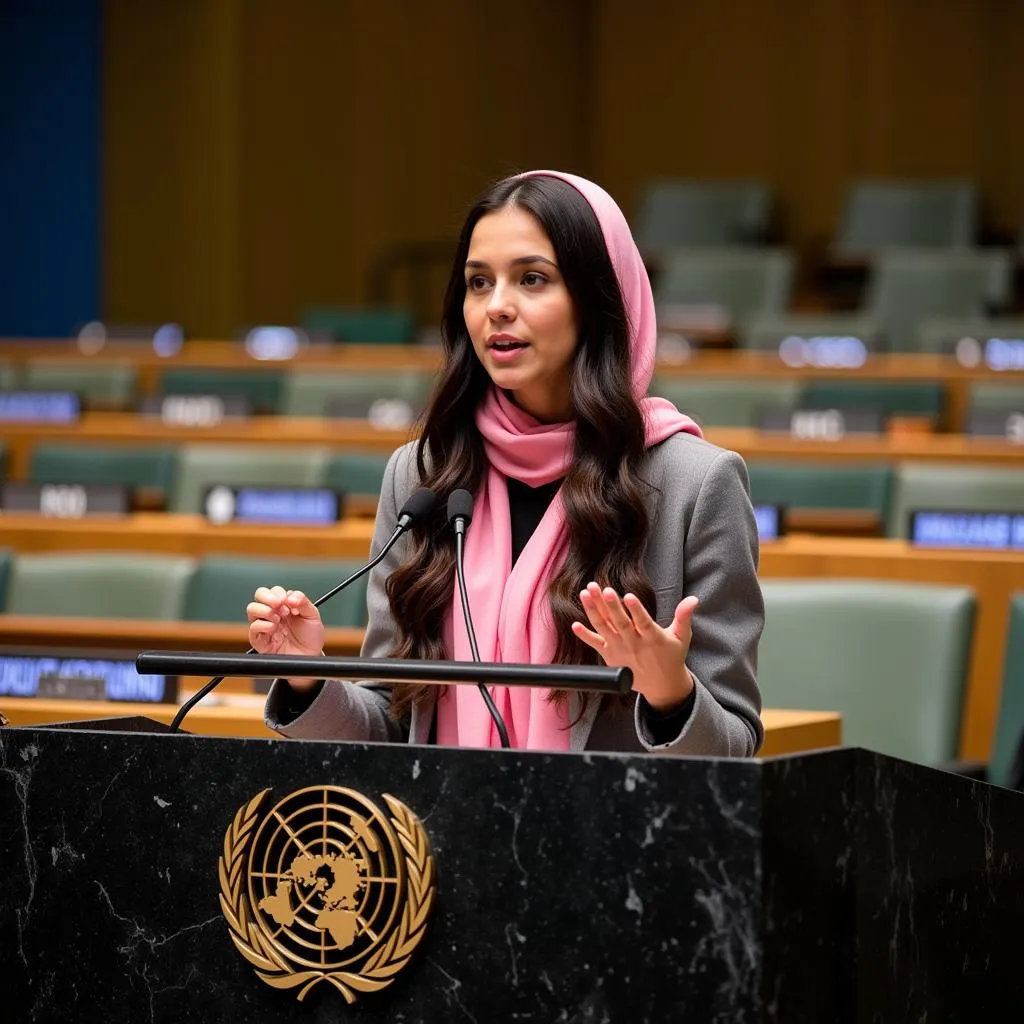The IELTS Speaking test often includes questions about influential people or public figures. One such topic that frequently appears is describing a person who is often in the news whom you would like to meet. This topic allows examiners to assess your ability to discuss current events, express opinions, and describe people in detail. Let’s explore how to tackle this topic effectively in your IELTS Speaking test.
Part 1: Introduction and Interview
In Part 1, the examiner may ask general questions about famous people or current events. Here’s a sample question with a suggested answer:
Q: Do you follow the news regularly?
A: Yes, I do try to stay informed about current events. I usually check the news on my smartphone app every morning and evening. It’s important to me to know what’s happening both locally and globally, especially in areas like politics, technology, and environmental issues.
Part 2: Long Turn (Cue Card)
Here’s a possible cue card for this topic:
Describe a person who is often in the news whom you would like to meet.
You should say:
- Who this person is
- What they do
- Why they are often in the news
- Why you would like to meet them
Sample Answer (Band 6-7):
The person I’d like to meet who is often in the news is Elon Musk. He’s a well-known entrepreneur and inventor who is the CEO of several companies, including Tesla and SpaceX. Musk is frequently in the news because of his innovative ideas and controversial statements on social media.
I would like to meet him because I find his vision for the future fascinating. He’s working on electric cars, space travel, and even brain-computer interfaces. I think it would be interesting to hear his thoughts on these technologies firsthand.
Musk is known for his ambitious goals, like colonizing Mars and transitioning the world to sustainable energy. While some people think his ideas are unrealistic, I admire his determination to push boundaries.
If I met him, I’d ask about his creative process and how he manages to run multiple companies simultaneously. I’m also curious about his views on artificial intelligence and its potential impact on society.
Overall, I believe a conversation with Elon Musk would be incredibly inspiring and thought-provoking, given his influence on technology and his unique perspective on the future.
Sample Answer (Band 8-9):
The public figure I’m particularly keen to meet is Malala Yousafzai, the renowned Pakistani activist and the youngest Nobel Prize laureate. Malala first captured global attention when she was targeted by the Taliban for advocating girls’ education in her home region of Swat Valley, Pakistan.
Malala is frequently in the headlines due to her tireless efforts in promoting education for girls and women’s rights worldwide. Her compelling speeches at international forums, including the United Nations, have solidified her status as a leading voice for human rights and gender equality.
I’m deeply inspired by Malala’s unwavering courage and her ability to transform personal adversity into a powerful global movement. Despite facing life-threatening circumstances, she has remained steadfast in her mission to ensure that every girl has access to quality education.
Meeting Malala would be an invaluable opportunity to gain insights into her remarkable journey from a young activist to a global icon. I’m particularly interested in understanding how she maintains her resolve in the face of ongoing challenges and backlash from conservative elements.
Moreover, I’d be keen to discuss her vision for the future of education, especially in conflict-ridden regions. Her perspective on leveraging technology to bridge educational gaps in developing countries would be fascinating to explore.
Ultimately, a conversation with Malala would not only be intellectually stimulating but also profoundly inspiring. Her indomitable spirit and commitment to social change serve as a powerful reminder of the impact one individual can have on the world.
 Malala Yousafzai speaking at the United Nations
Malala Yousafzai speaking at the United Nations
Follow-up Questions:
- How do you think meeting this person would impact your life?
Band 6-7 Answer: Meeting Elon Musk would definitely be exciting. I think it would motivate me to think bigger and not be afraid of taking risks in my career. His success might inspire me to pursue my own entrepreneurial ideas.
Band 8-9 Answer: Encountering Malala in person would undoubtedly have a profound impact on my perspective and aspirations. Her unwavering commitment to education and gender equality would likely ignite a stronger sense of social responsibility within me. I believe such an interaction would challenge me to reevaluate my own contributions to society and perhaps inspire me to take more concrete actions in advocating for educational access in my community.
- Do you think it’s important for public figures to use their fame for good causes?
Band 6-7 Answer: Yes, I think it’s important. Famous people have a lot of influence, so they can raise awareness about important issues. When celebrities support good causes, it can encourage their fans to get involved too.
Band 8-9 Answer: Absolutely. Public figures wield significant influence over public opinion and behavior, and with that influence comes a degree of social responsibility. When celebrities leverage their platform for philanthropic endeavors or to champion social causes, they can catalyze widespread positive change. This amplification effect can bring crucial issues to the forefront of public consciousness, mobilize resources, and inspire collective action on a scale that might otherwise be unattainable.
Part 3: Two-way Discussion
Q: How has social media changed the way we perceive public figures?
Band 6-7 Answer: Social media has made public figures seem more accessible. We can now see their daily lives and thoughts through their posts. This can make them feel more relatable, but it also means their mistakes are more visible. Sometimes, it’s hard to know if what we see online is their real personality or just a carefully crafted image.
Band 8-9 Answer: Social media has fundamentally transformed our perception of public figures, blurring the lines between their public and private personas. This unprecedented access has fostered a sense of intimacy between celebrities and their followers, allowing for more direct engagement and seemingly unfiltered glimpses into their lives.
However, this heightened visibility is a double-edged sword. While it can humanize public figures and make them more relatable, it also subjects them to intense scrutiny and can amplify minor missteps into full-blown controversies. The immediacy of social media means that public opinion can shift rapidly, and reputations can be built or destroyed in a matter of hours.
Moreover, the curated nature of social media content raises questions about authenticity. The carefully constructed online personas of public figures often present an idealized version of their lives, which can distort public perception and create unrealistic expectations.
Ultimately, social media has democratized fame to some extent, allowing individuals to cultivate their own following and influence. This has expanded the definition of what it means to be a public figure, challenging traditional notions of celebrity and reshaping the dynamics of public discourse.
 The impact of social media on public figures
The impact of social media on public figures
Q: Do you think the media focuses too much on celebrities rather than important issues?
Band 6-7 Answer: Yes, I think there’s often too much focus on celebrities. While entertainment news can be fun, it sometimes overshadows more serious issues. It would be better if there was a balance between celebrity news and coverage of important global events or social problems.
Band 8-9 Answer: The disproportionate focus on celebrities in media coverage is indeed a contentious issue that warrants scrutiny. While celebrity news undeniably caters to public interest and serves as a form of escapism, its overwhelming prevalence often comes at the expense of more substantive reporting on critical societal issues.
This imbalance in coverage can have far-reaching implications. It can divert public attention from pressing matters such as climate change, socioeconomic disparities, or geopolitical conflicts, potentially leading to a less informed citizenry. The sensationalism often associated with celebrity news can also trivialize serious discourse and undermine the gravity of important social and political debates.
However, it’s crucial to recognize that this phenomenon is largely driven by consumer demand. Media outlets, particularly in the digital age, are under immense pressure to generate clicks and engagement, which celebrity content reliably delivers. This creates a cyclical pattern where audience preferences shape content, which in turn reinforces those preferences.
The challenge lies in striking a balance between satisfying public interest in celebrities and fulfilling the media’s fundamental role as a source of important information and a facilitator of public discourse. This might involve more thoughtful curation of news content, innovative approaches to presenting serious topics, and efforts to leverage celebrity influence to draw attention to substantive issues.
Ultimately, addressing this imbalance requires a concerted effort from media producers, consumers, and educators to promote media literacy and cultivate a more discerning audience that demands and engages with diverse, meaningful content.
Key Vocabulary and Phrases for High Scores
-
Capture global attention /ˈkæptʃər ˈgləʊbəl əˈtenʃən/ (phrasal verb): To become the focus of worldwide interest.
Example: Her groundbreaking discovery captured global attention in the scientific community. -
Tireless efforts /ˈtaɪərləs ˈefərts/ (noun phrase): Continuous hard work without giving up.
Example: Despite facing numerous setbacks, her tireless efforts finally led to a breakthrough in cancer research. -
Unwavering courage /ʌnˈweɪvərɪŋ ˈkʌrɪdʒ/ (noun phrase): Constant bravery that doesn’t diminish.
Example: The firefighter showed unwavering courage as he rescued people from the burning building. -
Transform adversity /trænsˈfɔːrm ədˈvɜːrsəti/ (verb phrase): To change difficult situations into positive outcomes.
Example: Nelson Mandela’s ability to transform adversity into opportunity inspired millions around the world. -
Indomitable spirit /ɪnˈdɒmɪtəbl ˈspɪrɪt/ (noun phrase): An attitude that cannot be subdued or defeated.
Example: Despite facing numerous challenges, her indomitable spirit kept her moving forward towards her goals.
 Key vocabulary for IELTS Speaking success
Key vocabulary for IELTS Speaking success
Examiner’s Advice
To excel in the IELTS Speaking test, particularly when discussing public figures or newsworthy individuals:
- Stay informed about current events and notable personalities in various fields.
- Practice describing people in detail, focusing on their achievements, personalities, and impact.
- Develop your ability to express and justify opinions on complex topics.
- Use a range of vocabulary and grammatical structures to articulate your thoughts clearly.
- Incorporate relevant examples and personal anecdotes to support your points.
- Work on your fluency by regularly discussing news and current affairs with others.
- Be prepared to critically analyze the role of media and public figures in society.
Remember, the key to success in IELTS Speaking is not just about knowing the answers, but about expressing your ideas confidently and coherently. Regular practice and exposure to English-language media will significantly enhance your performance.
Describe a person who you are happy to know can be another interesting topic to explore as you prepare for your IELTS Speaking test. It allows you to practice describing personal relationships and emotions, which are equally important skills in the test.


